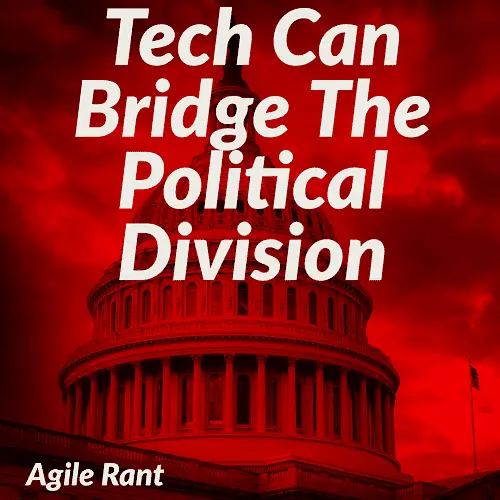How can technology bridge political division? The modern world is witnessing an unprecedented level of political polarization, with ideological differences tearing at the fabric of societies. This political division is causing more problems than we even know. The lack of bipartisanship is on display every day in America. But how can we bridge the political division? Technology has ways to help, if we embrace it to help with the polarization.
In an era dominated by technological advancements, it is crucial to explore how these very technologies can be utilized to mend the deep political chasms and foster understanding among diverse groups. By leveraging the power of technology, societies have a unique opportunity to bridge the political divide and build a united future. This essay will explore various ways in which technology can help solve the political division and pave the way towards unity.
- Enhanced Information Sharing and Accessibility:
- Social Media as a Tool for Constructive Dialogue:
- Virtual Town Halls and Debates:
- E-Voting and Enhanced Civic Participation:
- Data-Driven Policy Making:
- Online Deliberation Platforms:
- Virtual Reality Empathy Training:
- Online Education and Media Literacy:
- Online Mediation and Conflict Resolution:
- Conclusion on tech and political division
- Additional content to check out
Enhanced Information Sharing and Accessibility:
One of the most significant drivers of political polarization is the abundance of biased or misleading information on the internet and social media. Technology can address this issue by promoting transparency, fact-checking, and providing access to reliable sources. Algorithms can be developed to identify and flag misinformation, encouraging users to seek credible information before forming opinions. Furthermore, digital platforms can collaborate with independent fact-checking organizations to ensure the accuracy of content displayed.
Social Media as a Tool for Constructive Dialogue:
Social media has played a pivotal role in exacerbating political divides, acting as echo chambers that reinforce individuals’ pre-existing beliefs. However, when wielded effectively, these platforms can become forums for constructive dialogue and understanding. By implementing algorithms that expose users to diverse perspectives and moderate discussions to prevent toxic behavior, social media can become spaces for healthy debates and information exchange.
Virtual Town Halls and Debates:
Geographical barriers often limit opportunities for politicians to engage directly with their constituents. Technology can break down these barriers by facilitating virtual town halls and debates, enabling citizens to interact with elected officials irrespective of their location. This increased accessibility can lead to a better understanding of political leaders’ positions and their willingness to address diverse concerns.
E-Voting and Enhanced Civic Participation:
Technology can revolutionize the way citizens participate in the democratic process by introducing secure e-voting systems. E-voting can increase voter turnout and engage citizens who might otherwise find it challenging to participate in traditional polling. Additionally, blockchain technology can enhance the security and transparency of e-voting systems, assuring voters of the integrity of their choices.
Data-Driven Policy Making:
Data analytics and artificial intelligence (AI) can help politicians craft policies that resonate with a broader spectrum of the population. By analyzing large datasets and identifying patterns in public opinions, lawmakers can make informed decisions that address the concerns of diverse constituencies, leading to more inclusive governance.
Online Deliberation Platforms:
To encourage thoughtful discussions and collaborative problem-solving, online deliberation platforms can be established. These platforms provide a space for citizens to exchange ideas, propose solutions, and deliberate on critical issues, fostering empathy and understanding among participants with differing views.
Virtual Reality Empathy Training:
Virtual reality (VR) can be harnessed to create empathy training programs. By immersing individuals in scenarios that present perspectives different from their own, VR can help people develop empathy towards others’ experiences and reduce the tendency to view those with opposing beliefs as adversaries.
Online Education and Media Literacy:
Promoting media literacy and critical thinking skills is essential in combating misinformation and polarization. Technology can play a crucial role in providing accessible online education on media literacy, equipping individuals to discern credible information from misinformation.
Online Mediation and Conflict Resolution:
As political divisions often escalate into animosity and conflict, online mediation platforms can help facilitate constructive communication and resolution of disputes. Skilled mediators can engage with conflicting parties to find common ground and seek mutually acceptable solutions.
Conclusion on tech and political division
In a world plagued by political polarization, technology emerges as a powerful tool to heal divisions and foster unity. By enhancing information sharing, promoting constructive dialogue, encouraging civic participation, and nurturing empathy, technology can help bridge the political division. Tech can foster bipartisanship and a more unified political system.
However, the success of these technological solutions lies in the hands of individuals, policymakers, and technology companies, who must collaborate with responsibility and foresight. Embracing the potential of technology to create a more united society is a collective endeavor that requires the synergy of innovation, empathy, and open-mindedness. Only then can we aspire to build a world where diverse ideologies coexist harmoniously. Where political division and political polarization is a thing of the past.
Additional content to check out
7 Ideas to Reduce Political Polarization. Not centered on tech, but a good read.


